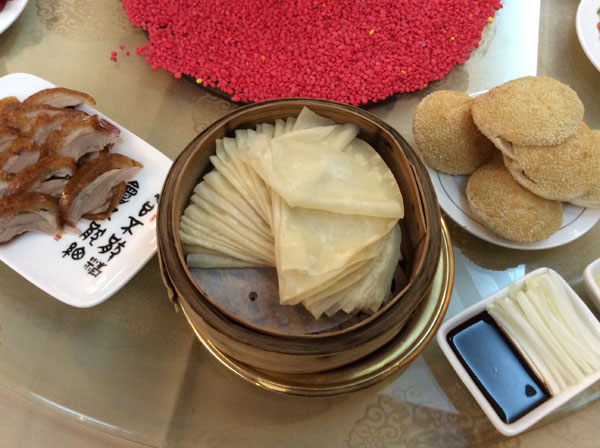Seeking classic Peking duck at Quanjude
 |
|
A set of Quanjude's roast duck features meat, lotus-leaf-shaped and hollow pancakes, sweet sauce and vegetable fillings. [Photo by Yang Feiyue/China Daily] |
A taste of Peking roast duck has been considered a must for any visitor to China's capital, on a par with visiting Tian'anmen Square and the Great Wall. With its history of 151 years, Quanjude is a respected place to experience the classic dish.
The brand's Hepingmen restaurant, built in 1979, not only offers gourmets a chance to dig into the traditional food but also the whole roast-duck culture, thanks to a 1,000-square-meter museum on the seventh floor. A visit there took me on a journey through 31 delicate steps of preparing the duck, from breeding to roasting, which helped me appreciate what was later on my plate.
Quanjude's whole roast duck (238 yuan, or $38) featured tender slivers of juicy meat with purplish red skin, complemented with lotus-leaf-shaped and hollow pancakes, sweet dip and vegetable fillings.
A chef carved the roasted bird in front of us onto two plates of meat with skins-and a small plate of crispy breast skin. Waiters then demonstrated the process of wrapping duck meat up with proper ingredients.
Mixing the soft roasted meat and skin with ingredients such as cucumber and spring onion creates a nice chemistry. The sweet sauce offers a lush but lighter, fresher taste than I've found at other duck eateries. The restaurant presents each pancake folded over, so they separate from each other easily-a real bonus.
The duck's crispy breast skin is considered by many Chinese to be its defining essence. Fresh duck oil erupts from the skin after one bite and fills the mouth, like water released from a sponge.
"We use ducks that are plump and sturdy with tender meat," says Wu Yubo, who supervises the restaurant's roasting operation now after more than 30 years experience in this technique.
















